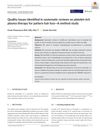 January 2025 in “Journal of Cosmetic Dermatology”
January 2025 in “Journal of Cosmetic Dermatology” Exosomes may help with hair growth and scar healing, but more research is needed.
 April 2024 in “International journal of impotence research”
April 2024 in “International journal of impotence research” Some men experience persistent sexual, neurological, and psychological symptoms after stopping finasteride, but evidence of permanent damage is inconclusive.
 March 2024 in “Clinical, cosmetic and investigational dermatology”
March 2024 in “Clinical, cosmetic and investigational dermatology” Severe alopecia areata greatly impacts quality of life, mental health, and daily activities.
 October 2023 in “Dermatology practical & conceptual”
October 2023 in “Dermatology practical & conceptual” Many patients experienced hair loss after COVID-19, with women affected more, starting on average 49 days post-infection.
 July 2023 in “Skin health and disease”
July 2023 in “Skin health and disease” Most UK survey participants had negative side effects from botulinum toxin injections, with many not fully recovering physically, emotionally, or financially.
The serum is safe and effective for treating hair loss.
 September 2022 in “Journal of The American Academy of Dermatology”
September 2022 in “Journal of The American Academy of Dermatology” Different types of hair loss are linked to COVID-19, with some types possibly increasing risk of getting the virus, while others may be triggered or worsened by the virus.
 January 2022 in “Clinical dermatology open access journal”
January 2022 in “Clinical dermatology open access journal” Certain cannabinoids may help increase hair growth and could be useful for treating hair loss.
 May 2020 in “Hair transplant forum international”
May 2020 in “Hair transplant forum international” Younger people and those with existing acne are more likely to get folliculitis after hair restoration surgery, but it doesn't affect the overall good hair growth result.
 December 2019 in “Journal of cosmetic dermatology”
December 2019 in “Journal of cosmetic dermatology” Systematic reviews on platelet-rich plasma therapy for hair loss have many quality issues.
 January 2019 in “Springer eBooks”
January 2019 in “Springer eBooks” Acne can appear or persist in adulthood due to hormonal changes, external factors, or substance use, and requires appropriate treatment.
 May 2018 in “European Journal of Dermatology”
May 2018 in “European Journal of Dermatology” The first Japanese family with Marie Unna hereditary hypotrichosis showed hair condition improvement in a child and highlighted the risk of misdiagnosis.
 September 2009 in “Journal of the Dermatology Nurses’ Association”
September 2009 in “Journal of the Dermatology Nurses’ Association” Hair loss significantly affects quality of life, wet combing is better than visual inspection for finding head lice, many with oral lichen planus have allergies, and wet wraps with steroids quickly improve itchy skin conditions.
 March 2005 in “Journal of The American Academy of Dermatology”
March 2005 in “Journal of The American Academy of Dermatology” Itch is a common symptom in patients with chronic venous insufficiency, often accompanied by burning and pain.
 June 2012 in “Prescriber”
June 2012 in “Prescriber” Topical minoxidil effectively and safely treats female pattern hair loss, but other treatments need more research.
 18 citations,
January 1999 in “CNS Drugs”
18 citations,
January 1999 in “CNS Drugs” Some anticonvulsant drugs can cause skin reactions, ranging from mild to severe, and managing these reactions is important for patient care.
 9 citations,
December 2020 in “Dermatologic Therapy”
9 citations,
December 2020 in “Dermatologic Therapy” Certain drugs are effective for skin conditions like psoriasis, vitiligo, and hair loss.
 8 citations,
November 2022 in “International Journal of Cosmetic Science”
8 citations,
November 2022 in “International Journal of Cosmetic Science” Human hair varies widely and should be classified by curl type rather than race.
 3 citations,
August 2013 in “Journal of the National Cancer Institute”
3 citations,
August 2013 in “Journal of the National Cancer Institute” The number of advanced breast cancer cases in women under 40 has increased, but the overall numbers are still low.
 491 citations,
July 2000 in “The Journal of Clinical Endocrinology and Metabolism”
491 citations,
July 2000 in “The Journal of Clinical Endocrinology and Metabolism” Polycystic ovary syndrome is found in 6.5% of unselected Caucasian women in Spain.
 298 citations,
July 2000 in “The Journal of Clinical Endocrinology and Metabolism”
298 citations,
July 2000 in “The Journal of Clinical Endocrinology and Metabolism” About 6.5% of young Caucasian women in Spain have polycystic ovary syndrome.
 88 citations,
May 2011 in “British Journal of Clinical Pharmacology”
88 citations,
May 2011 in “British Journal of Clinical Pharmacology” High doses of cyproterone acetate are linked to an increased risk of developing meningioma.
 66 citations,
November 2001 in “European journal of endocrinology”
66 citations,
November 2001 in “European journal of endocrinology” Low SHBG and high FAI, FT, and DHEAS levels are effective in identifying PCOS.
 50 citations,
December 1998 in “Dermatologic Surgery”
50 citations,
December 1998 in “Dermatologic Surgery” Hair loss is more common in men aged 18-49 and increases with age.
 20 citations,
April 2014 in “Dermatologic Therapy”
20 citations,
April 2014 in “Dermatologic Therapy” Sulfotransferase in hair follicles helps predict how well minoxidil works for female hair loss.
 18 citations,
June 2018 in “Journal of The American Academy of Dermatology”
18 citations,
June 2018 in “Journal of The American Academy of Dermatology” Fat tissue treatments may help with wound healing and hair growth, but more research with larger groups is needed to be sure.
 7 citations,
April 2021 in “Dermatology and Therapy”
7 citations,
April 2021 in “Dermatology and Therapy” H-1 antihistamines may help with various skin conditions, but more research is needed to confirm their effectiveness.
 6 citations,
October 2018 in “Drug safety - case reports”
6 citations,
October 2018 in “Drug safety - case reports” Alitretinoin may cause irreversible hair curling as a side effect.

PCOS has a strong genetic basis, but more research is needed to fully understand it.
 1 citations,
January 1980 in “Archives of Dermatology”
1 citations,
January 1980 in “Archives of Dermatology” Syphilis chancres can be atypical, and fiber implantation for baldness is risky and often fails.





























